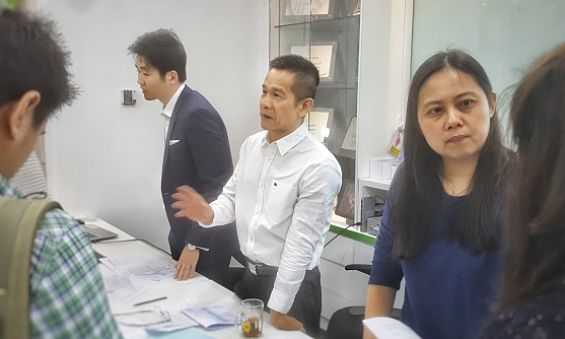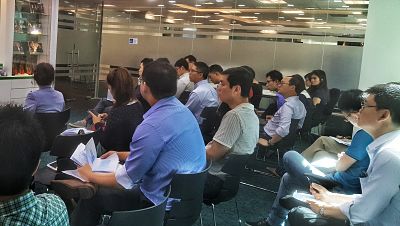 Moulds for producing gloves at Riverstone. Moulds for producing gloves at Riverstone. NextInsight file photoIn 2014, Malaysia-based Riverstone Holdings embarked on a 5-year plan to expand its production capacity, raising eyebrows of investors who noted the excess capacity among glove manufacturers in Malaysia. But every year since, Singapore-listed Riverstone has achieved high utilisation rates -- and sales -- for its new capacity. Thus, its revenue nearly doubled from RM357.9 m in 2013 to RM654.9 m in 2016, almost in tandem with the doubling in production capacity. Similarly, its net profit has doubled, rising from RM58.0 m to RM120.4 m in that period. By the end of this year, Riverstone will have added 4.1 billion glove production capacity to the 3.2 billion it had in 2013 (see table). |
|
Year |
Added capacity |
|
Final Capacity |
|
2013 |
-- |
|
3.1 billion |
|
2014 |
+1.1 billion |
|
4.2 billion |
|
2015 |
+1 billion |
|
5.2 billion |
|
2016 |
+1 billion |
|
6.2 billion |
|
2017 |
+1 billion |
|
7.2 billion |
|
2018F |
+1.4 billion |
|
8.6 billion |
|
2019F |
+1.4 billion |
|
10.0 billion |
Riverstone this week surprised with an announcement:
♦ Instead of the planned 1-billion extra capacity for next year, it will raise the figure to 1.4 billion instead.
♦ In 2019, which is Year 6 of the expansion programme, when no new capacity was planned previously, Riverstone would build a 1.4-billion capacity plant. Executive Chairman & CEO Wong Teek Son (centre) speaks with analysts after the 1Q17 briefing. CFO Tan Wang Thing is on the right while Financial PR associate director Tok Chong Yap is on the far left. Photo by Leong Chan Teik Riverstone Executive Chairman & CEO Wong Teek Son said: "Throughout the execution of the past phases, we have witnessed overwhelming support from new and existing customers when it came to consuming the additional production capacity."
Executive Chairman & CEO Wong Teek Son (centre) speaks with analysts after the 1Q17 briefing. CFO Tan Wang Thing is on the right while Financial PR associate director Tok Chong Yap is on the far left. Photo by Leong Chan Teik Riverstone Executive Chairman & CEO Wong Teek Son said: "Throughout the execution of the past phases, we have witnessed overwhelming support from new and existing customers when it came to consuming the additional production capacity."
• Revenue up strongly on higher sales volume, higher selling prices and higher demand for Riverstone's premium healthcare and cleanroom gloves. • Spike in raw material prices compressed gross profit margin by 3.9 percentage points to 25.2%. • Net profit margin at solid 16.3%. • Continues to generate positive operating cashflow of RM40.4 million. |
With business continuing to look good for Riverstone, it decided to add a 1.4-billion capacity plant in 2019 on a 9.9-acre piece of land where it is currently constructing a dormitory for its workers. The land adjoins its existing Taiping plants.
The capex for each phase is between RM80-85 million.
In addition, Riverstone has just acquired a 6,444 sq m piece of land with a built-up factory in Selangor for RM6.5m to expand the production capacity for cleanroom gloves -- expected to be from 1.5 billion cleanroom gloves to 2.0 billion gloves a year by this year-end. @ 1QFY17 results briefing. Replying to questions, Mr Wong said, among the new markets Riverstone is penetrating are China, Taiwan and South Korea, where customers are switching from PVC gloves for use in cleanrooms to the nitrile ones that Riverstone produces.
@ 1QFY17 results briefing. Replying to questions, Mr Wong said, among the new markets Riverstone is penetrating are China, Taiwan and South Korea, where customers are switching from PVC gloves for use in cleanrooms to the nitrile ones that Riverstone produces.
The customers are in the mobile, tablet, and LCD manufacturing industries, and often require customised solutions for gloves. The process and evaluation take months, and up to a year.
It's not just cleanroom gloves but also healthcare gloves which Riverstone has been ramping up sales.
|
Stock price |
95.5 c |
|
52-week range |
81.5 – 97.5 cts |
|
PE (ttm) |
17x |
|
Market cap |
S$715 m |
|
Shares outstanding |
741 m |
|
Dividend yield |
2.18% |
|
Year-to-date return |
9.7% |
|
Source: Bloomberg |
|
Challenges Riverstone continues to face include rising labour costs, fluctuations in raw material prices and competition from other glove suppliers.
On the latter point, Mr Wong said: "Many manufacturers are trying to come into the cleanroom glove segment because it has a higher profit margin. It's not easy because the gloves are for protecting the user as well as the product.
"You need to understand the users' needs, especially in terms of the effects of contamination and corrosion."
Watch this video of our visit to Riverstone's ever-expanding manufacturing site in Taiping -->





